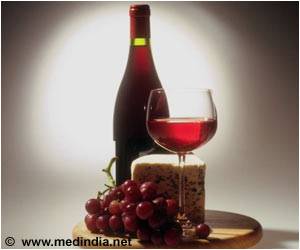Clean vineyards, "green" wines and lighter bottles? Many in the global wine and spirits business believe their only chance of long-term survival lies with sustainable development.
Even as the crisis threatens the industry's short-term survival, winegrowers large and small already are grappling with long-term viability."Within five years, there will be a global standard of sustainability and a level below which you cannot be," said Robert Joseph, a London-based writer and wine producer with interests in several countries.
He was speaking at Vinexpo, the world?s largest wine trade show that ran last week in Bordeaux.
Sustainable development -- not to be confused with organic or biodynamic production -- relies on finding a balance between social, economic and environmental costs and benefits.
It for instance would allow vine treatments in humid climates where rot could wipe out a crop overnight, but with limited use at low doses. It also requires care for the watershed and surrounding habitat.
In some case the motivation is altruistic, but in many cases it?s about managing future costs.
Advertisement
Castel produced 579 million bottles of wine in 2007. At the Loire facility, they treat enough water for a city of 60,000 inhabitants.
Advertisement
Most agree that sustainable development means higher costs, initially. "It does cost a little more," said Larry Stone, General Manager of Francis Ford Coppola?s Rubicon Estate. "But it gets repaid in the health and attitude of the worker."
Stone and his fellow winegrowers are convinced that sustainable development is "the right thing to do to protect Napa Valley for the future."
Growers in the 18,000-hectare (45,000-acre) region, which Stone estimates to be 95 percent family-owned, are pushing an initiative called "Napa Green" because "they don?t want to see Napa destroyed," he said.
The desire to have something to pass on to the next generation also struck a chord among the Old World wine producers.
At the wine cooperative Val d?Orbieu, whose members? vineyards stretch over 9,000 hectares along the French Mediterranean, the emphasis is on fewer vine treatments, waste reduction, renewable energy sources, water management and diversity amongst employees.
"The economic crisis has accelerated sustainable development," said Michel Mathieu, Director of Marketing and Business Development. "But I just call it good sense."
Val d?Orieu even rethought its stand at Vinexpo. The cooperative ordered an ecologically designed exhibit stand, including re-useable glass and wood panels, rented furniture, and eco-friendly paint. According to the stand creator, it was the first such order they had ever received.
Peripheral issues also count, like packaging and advertising.
Joseph and his partners at Hugh, Kevin & Robert Wines, have launched a new line called "Greener Planet Sustainable", which is a low carbon footprint wine. One of these, retailing at roughly 10 dollars and packaged in a lighter plastic PET bottle, has been snapped up by importers for Norway and Holland. The company's overall French production is 85,000 cases a year.
Another buzz at Vinexpo was for an innovative line of bottles called Ecova produced by Saint Gobain, Europe?s largest glass manufacturer.
Didier Dumas, Director of Viticulture for Saint Gobain in the southwest, said in a phone interview that he has already sold out of everything they?ve manufactured in the Ecova line, which weighs up to 90 grams (30 ounces) lighter than a regular bottle and is made entirely from recycled glass.
Lighter bottles will dramatically lower the carbon footprint left by transporting wine.
Whether driven by concerns for the environment or managing costs, the foresight of the early pioneers of sustainable development in the wine trade is paying off commercially.
Chateau Larose Trintaudon, a 225-hectare estate outside Bordeaux, was the first European vineyard to be certified for sustainable development, in 2004.
The wine estate, owned by insurance giant EGF-Allianz, exhibited at Vinexpo for the first time this year to see if there was any interest from importers in what had evolved into a company ethos.
Vision paid off. An importer from Belgium has already placed an order and another contract is under negotiation with Germany.
"We manage to do everything without spending more," said Bruno Pastre, General Director. "We just do it more intelligently."
Source-AFP
GPL









